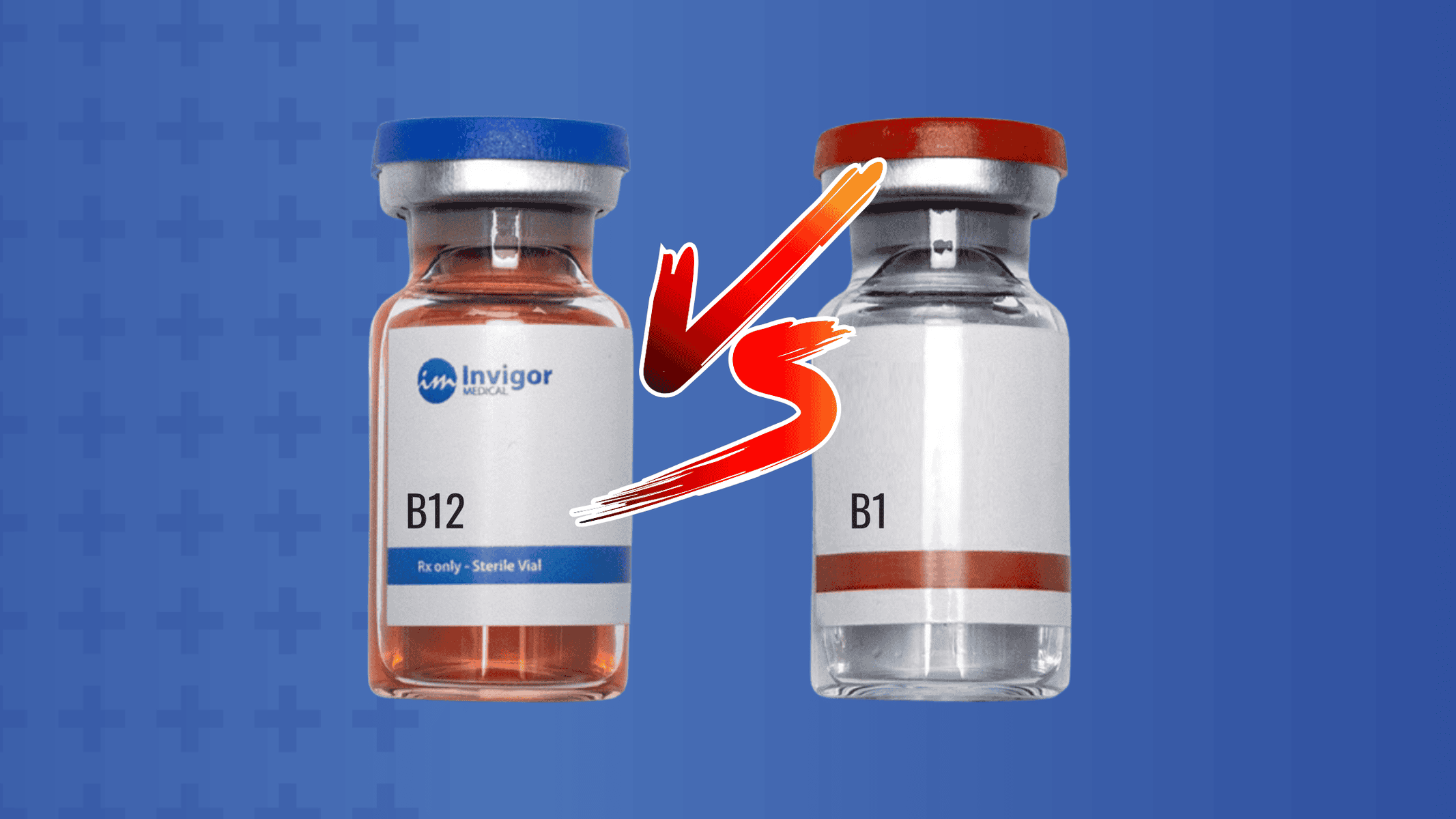Vitamin B12 vs Vitamin B1—it’s a common dilemma when considering supplements to boost energy levels, support weight loss, or confront the signs of aging. Both vitamins are essential in maintaining your health, yet they play distinct roles in your body. In this article, we’ll delve into the differences between Vitamin B12 and Vitamin B1, comparing their safety, effectiveness, and dosing to help you make an informed decision. Ready to discover which vitamin might be the key to enhancing your well-being? Let’s dive deeper into their comparison.

Health Benefits: What Vitamin B12 and Vitamin B1 Can Do for You
What it Treats
- Supports nerve health and brain function
- Manages fatigue by boosting energy levels
- Improves red blood cell formation
- Addresses pernicious anemia
- Supports cardiovascular health
- Supports carbohydrate metabolism for energy production
- Manages symptoms of beriberi, a thiamine deficiency
- Improves cognitive functions and memory
- Addresses symptoms of Wernicke-Korsakoff syndrome
- Supports overall nervous system health
How it Works
Main Benefits
- Alleviates symptoms of vitamin B12 deficiency, including fatigue and weakness
- Treats pernicious anemia and boosts red blood cell production
- Supports cognitive function and reduces the risk of nerve damage
- Enhances energy levels for improved daily performance
- Aids in maintaining cardiovascular health by managing homocysteine levels
- Reduces symptoms of beriberi, a condition caused by thiamine deficiency
- Treats cognitive impairments and supports memory function
- Controls symptoms of Wernicke-Korsakoff syndrome, particularly in individuals with alcohol dependence
- Supports energy metabolism through efficient carbohydrate conversion
- Alleviates stress and anxiety by supporting nervous system health
Guidelines for Administration and Supplementation with Vitamin B12 and Vitamin B1
Dosing Requirements
- Method of Administration: Vitamin B12 can be administered orally, through sublingual tablets, or by injection.
- Typical Dosage: Common daily dosages for oral supplements range from 500 to 1,000 micrograms.
- Optimal Timing: It is best taken in the morning, with or without food, to boost energy levels for the day.
- Safe Combinations: Vitamin B12 pairs well with folic acid supplements and can be combined safely with vitamin D3.
- Method of Administration: Thiamine is typically taken orally in tablet form.
- Typical Dosage: A standard daily dose is around 100 mg to 300 mg, depending on the individual’s needs.
- Optimal Timing: It should be taken in the morning, preferably with meals, to aid digestion and absorption.
- Safe Combinations: Thiamine can safely be combined with other B-complex vitamins and magnesium supplements.
Effect Duration
- Onset Time: Vitamin B12 injections can begin working within 24 to 48 hours, whereas oral supplements might take a few days to start showing effects.
- Duration of Therapeutic Effects: The effects of Vitamin B12 can last for weeks, especially with injections, due to its ability to be stored in the liver.
- Immediate vs. Cumulative Effects: Some immediate energy boosts can be felt shortly after administration, but overall benefits are cumulative with continued use.
- Noticeable Results: Most individuals notice significant improvements in energy and cognitive function within a couple of weeks of consistent supplementation.
- Onset Time: Thiamine typically begins to work within a few hours of ingestion, with rapid absorption into the bloodstream.
- Duration of Therapeutic Effects: The effects of Thiamine can last for several hours, requiring regular daily dosing for sustained benefits.
- Immediate vs. Cumulative Effects: Thiamine provides an immediate enhancement in energy metabolism, and its cognitive benefits accumulate with regular use.
- Noticeable Results: Noticeable improvements in energy and mental clarity often occur within a few days to a week of regular supplementation.
Safety and Side Effects: Comparing Vitamin B12 and Vitamin B1
Side Effects and Safety
Common Side Effects:
- Mild headache
- Nausea
- Diarrhea
Vitamin B12 has a high safety profile with side effects typically being mild and temporary. Severe reactions are rare, but if you experience symptoms like chest pain or shortness of breath, seek medical attention immediately. Interactions with other medications are minimal, but it’s best to consult with a healthcare provider if you’re taking other medications.
Common Side Effects:
- Mild skin rash
- Upset stomach
- Irritability
Thiamine is generally safe with most side effects being mild and temporary. Severe side effects are uncommon but if dizziness or severe allergic reactions occur, consult a medical professional promptly. Drug interactions are rare, though it’s advisable to discuss your current medications with a healthcare provider, especially if incorporating new supplements.
Determining the Right Supplement: Who Benefits Most from Vitamin B12 and Vitamin B1?
Ideal Candidate
Individuals looking to enhance energy levels and support nerve health can benefit significantly from Vitamin B12 supplementation.
- Adults over 50 who may face challenges absorbing B12 from food.
- Individuals experiencing fatigue or weakness due to vitamin B12 deficiency.
- Those with pernicious anemia requiring regular B12 intake for red blood cell production.
Thiamine is especially beneficial for promoting energy metabolism and supporting cognitive functions.
- Young adults and seniors with diets low in thiamine-rich foods, such as whole grains.
- Individuals with a history of alcoholism, which can lead to thiamine deficiency.
- Patients experiencing symptoms of beriberi or early signs of cognitive decline.
Choosing the Superior Supplement: Why Vitamin B12 Is the Optimal Choice for Energy and Vitality
The ability to support nerve health makes Vitamin B12 stand out, especially for those seeking solutions to fatigue and energy loss. While Vitamin B1 offers valuable benefits in energy metabolism and cognitive support, Vitamin B12’s effectiveness in enhancing overall vitality and managing conditions like pernicious anemia provides a distinct advantage. Given its broader range of applications and benefits for adults over 50, Vitamin B12 emerges as the preferred choice for most patients aiming to improve their energy levels and overall well-being.



